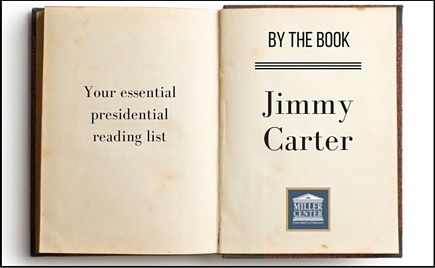By the Book: Jimmy Carter

The first year of a new president’s first term is always a crucible. But often it’s only in hindsight, within the carefully considered pages of an authoritative presidential biography, that the full measure of that first year can be taken. In this new series on the best presidential biographies, Miller Center presidential scholars and experts recommend the ones most worth reading.
A businessman defies the conventional wisdom, challenges sacred cows, and comes out of nowhere to garner his party’s nomination. The Donald Trump story, right? Perhaps. But the first iteration of that narrative was forged by Jimmy Carter, the peanut farmer from Plains, Georgia. As Bruce Schulman has written, “Carter invented the modern outsider campaign that has come to define contemporary presidential politics. He laid out the blueprints for Trump’s unconventional candidacy.”
There are many reasons to read about President Jimmy Carter. Julian Zelizer’s Jimmy Carter provides a balanced and authoritative overview of a presidency that straddled ideological change. The Carter Presidency: Policy Choices in the Post-New Deal Era, edited by Hugh Davis Graham and Gary Fink, provides the first archivally-based glimpse into a range of policies, from urban development to trade and foreign policy. Douglas Brinkley has chronicled what might be the most effective post-presidency in the modern era in The Unfinished Presidency: Jimmy Carter’s Journey Beyond the White House.
Yet the best way to understand the Carter presidency is to imbibe a cocktail that consists of two parts Bruce Schulman and one part Carter himself. As its subtitle suggests, Schulman’s The Seventies: The Great Shift in American Culture, Society and Politics, offers the context required to understand why Americans were so eager to turn to an outsider in the first place. His short essay, quoted above, explains why this outsider approach to politics retained such staying power. But the ingredient that makes the cocktail most memorable is no secret: It is Carter himself. And there is no better place to sample any of the president’s own words than the Miller Center’s Presidential Speech Archive. There, I recommend reading and listening to the “Crisis of Confidence” Speech (July 15, 1979). It will not inspire confidence. But it does offer a window into a tumultuous time in America’s political development and the would-be outsider who found himself trapped at the center of it.